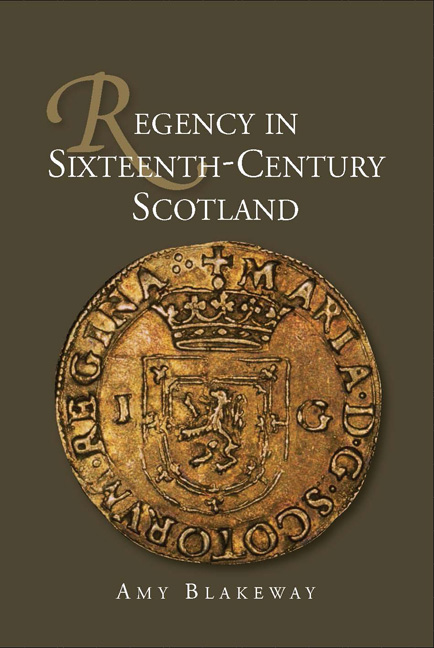Book contents
- Frontmatter
- Dedication
- Contents
- List of Figures and Tables
- Acknowledgements
- List of Abbreviations
- Timeline of Regents and Monarchs
- Introduction
- 1 Concepts of Regency
- 2 Concepts of Regency in Practice
- 3 Regency Finances
- 4 Households and Courts
- 5 Justice and Regency
- 6 Regency Diplomacy
- Conclusion
- Appendix 1 The Treasurer's Accounts
- Appendix 2 The Comptroller's Accounts
- Appendix 3 The Collectors of the Thirds' Accounts
- Appendix 4 Justice Ayres in Sixteenth-Century Scotland
- Bibliography
- Index
1 - Concepts of Regency
Published online by Cambridge University Press: 05 May 2015
- Frontmatter
- Dedication
- Contents
- List of Figures and Tables
- Acknowledgements
- List of Abbreviations
- Timeline of Regents and Monarchs
- Introduction
- 1 Concepts of Regency
- 2 Concepts of Regency in Practice
- 3 Regency Finances
- 4 Households and Courts
- 5 Justice and Regency
- 6 Regency Diplomacy
- Conclusion
- Appendix 1 The Treasurer's Accounts
- Appendix 2 The Comptroller's Accounts
- Appendix 3 The Collectors of the Thirds' Accounts
- Appendix 4 Justice Ayres in Sixteenth-Century Scotland
- Bibliography
- Index
Summary
On 20 October 1568, two groups of Scots were invited to ‘declare their Opinions, for the government of their Realme in the minoritie of their Prince’. The question was both pertinent and topical, since in May that year Mary, Queen of Scots, had escaped from her imprisonment in Lochleven castle and fled across the border to England. Unwilling to sanction rebellion against a fellow anointed monarch, but equally unwilling to restore Mary (a Catholic and a dynastic threat), Elizabeth ordered Mary's imprisonment. In an attempt to secure a compromise between Mary and her opponents, Elizabeth summoned representatives from both sides to discuss provision for the government of Scotland. These debates have subsequently become known as either the ‘trial’ of Mary, Queen of Scots or the York-Westminster conference. Whether or not Mary was an adulteress and murderess, whether or not her deposition was valid, the fact was that in her absence from the realm governmental provision was necessary. Inevitably, therefore, the conversation turned to regency.
Despite the fact that this question sparked the most detailed extant sixteenth-century discussion of Scottish regency, the two resulting statements have been largely ignored or dismissed. Instead, historical interest in the conference has largely focused upon the practical matters which delegates discussed. The notorious ‘Casket Letters’ and Mary's indictment for the murder of her second husband, Lord Darnley, have thus been prioritised as the main documents of interest arising from the conference. This neglect of the statements on regency is typical of the broader lack of attention to this subject, but it is somewhat surprising, since the English commissioners who attended the conference had evidently anticipated that discussions would extend beyond questions relating to Mary's love life to issues that touched upon the very nature of governance. Prior to the conference, the experienced English diplomat, Sir Ralph Sadler, suggested that potential topics for discussion included questions such ‘as who is a Tyraunt, who may depose a Tyraunt, and whether she [Mary] be bound by that she did in prison’.
- Type
- Chapter
- Information
- Regency in Sixteenth-Century Scotland , pp. 17 - 53Publisher: Boydell & BrewerPrint publication year: 2015



